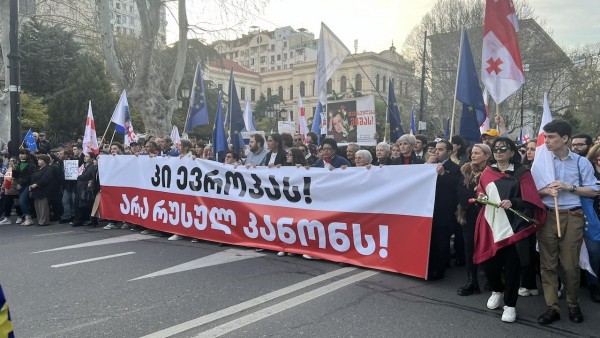This piece is published in collaboration with Gazeta Wyborcza as part of a content series on threats to independent media in Central Europe. Read more.
The article is available in Polish on Gazeta Wyborcza’s website.
Polish TV channel TVN 7 waited for its license for over a year before it was eventually granted, even though the process should only be a formality. The delay is the latest example of how media which are critical of the government are unfairly treated, and it highlights the struggles faced by Poland’s free media.
Imagine that you have a business but need the relevant authority’s permission to run it. You meet all the formal requirements and are waiting for the licence. You wait longer, and longer. A year later, you are still waiting – and the day the licence expires is approaching.
This is not a comfortable situation, but in Poland, this is the way things work for broadcast media.
“In light of the law, an administrative decision – and that is what the decision to reissue a licence is – should be made promptly, within two months at most. This guarantees each broadcaster’s operational and business stability. Delaying the decision has a measurable impact on our day-to-day operations; primarily management, as well as short- and long-term planning,” says Katarzyna Issat, director of corporate communications at TVN.
The broadcaster had to face the risk that the extension may not come in time, in which case it is likely that the National Broadcasting Council would have launched a tender for the broadcaster slot vacated by the channel. This would probably have been filled by right-wing, pro-ruling party, PiS, networks such as TV Republika.
The entertainment channel TVN7 is part of American TVN Group. The group also controls news channel TVN 24, which was targeted earlier by the so-called ‘lex TVN’ which aimed to force the channel’s American owner to sell it by tightening up laws around foreign ownership.
For TVN7’s licence to be extended, four out of five of the members of the National Broadcasting Council needed to vote in favour. For over a year after TVN first applied for the licence, two members – Janusz Kawecki and Andrzej Sabatowski – repeatedly voted against. These Council members were put forward by President Andrzej Duda, who, however, was the one to veto the ‘lex TVN’ law.
Their argument was that TVN violates the Broadcasting Act as its effective owner is Discovery, an American company, and the Act only allows channels owned by companies from the European Economic Area to be granted licences. TVN’s formal owner is Polish Television Holding, based in Amsterdam, which is managed by US-based Discovery.
“There are no rational reasons for the National Broadcasting Council not to renew the licence. In his extensive justification of why he vetoed the ‘lex TVN’, President Andrzej Duda showed that this kind of law would violate international agreements, property rights, acquired rights, and so on. All these arguments apply to the TVN 7 licence. A licence may be withdrawn in an exceptional situation, if the licensee repeatedly breaks the rules,” says Professor Stanisław Jędrzejewski, an expert on the media at Kozminski University in Warsaw.
“The regulatory body should retain its independence from the world of politics and the market, impartiality and equal distance from all the players on the market. If it does not follow these rules, it spoils the market and exposes itself to accusations of partiality, limiting the pluralism and diversity of the messages transmitted by the media, and acting in the name of someone’s political interests,” said Jędrzejewski.
The situation was unprecedented, because the National Broadcasting Council has never refused to extend an existing terrestrial licence despite the broadcaster meeting all the conditions, said Issat.
In an article published in Gazeta Wyborcza, Krzysztof Luft, a former member of the National Broadcasting Council, noted that the deadlines for considering applications in the code of administrative procedure continue to apply: 30 days or, in exceptional circumstances, 60 days.
“This is a purely political matter. It is political revenge against an independent television channel that has the courage to criticize the authorities,” said Jakub Bierzyński, a sociologist and political strategist who founded and heads the OMD media group.
“It is about making life difficult and causing financial losses for Discovery Group. Since its activity could not be hampered through the ‘lex TVN’, other means have to be used. This kind of economic pressure is widely used in authoritarian regimes’ struggle against the free media. The same thing is happening in Russia, Hungary and Turkey,” Bierzyński added.
What’s the future for TVN?
TVN 7 is available via satellite, but also – significantly – via terrestrial broadcasting. To broadcast via satellite, a licence issued in any EU country is enough, but terrestrial broadcasting requires a decision by Poland’s National Broadcasting Council. Losing the latter option would decrease the channel’s reach, although – according to Bierzyński’s analysis – it would not have a significant impact on the advertising market.
To protect itself against this scenario, the company obtained a licence in the Netherlands.
We also know what would have happened if TVN 7 failed to get an extension. The National Broadcasting Council will launch a new competition for the MUX-2 terrestrial digital broadcaster slot vacated by the channel.
“It may be that some entity is waiting for TVN 7’s license to effectively be withdrawn and counting on the National Broadcasting Council launching a new competition for the MUX-2 slot,” said Jędrzejewski
MWE Networks and right-wing television channel TV Republika are supposedly interested in springing in to TVN 7’s place.
“We will analyze different scenarios; for now we are testing expansion on local MUXes with the DVB-T/HEVC standard,” said Radosław Dobrzyński, a member of the TV Republika management board, in an interview with Wirtualnemedia.pl.
TVN now has a license until 2024
It cannot be ruled out that the biggest losses due to the tug of war with the American investor will be suffered by the National Broadcasting Council itself.
“The National Broadcasting Council’s reputation, which is already poor, will crumble,” said Jędrzejewski. “The regulatory body should retain its independence from the world of politics and the market, impartiality and equal distance from all the players on the market. If it does not follow these rules, it obviously spoils the market and exposes itself to accusations of partiality, limiting the pluralism and diversity of the messages transmitted by the media, and acting in the name of someone’s political interests.”
“The next channel whose licence is ending is our main antenna. TVN’s current license ends in 2024,” Issat added.
The current Council was appointed in 2016 – entirely by the ruling PiS party. The Sejm appointed Witold Kołodziejski (a PiS councilor in the Mazovia region) and Elżbieta Więcławska-Sauk, the Senate appointed Teresa Bochwic, and President Duda appointed Andrzej Sabatowski and Prof. Janusz Kawecki, who was a member of Radio Maryjo’s program council, and runs hist own show in Radio Maryja. He was on the academic board of the College of Social and Media Culture in Toruń and is a commentator on TV Trwam, and in Nasz Dziennik and Moja Rodzina. All these Catholic media are staunch allies of PiS ruling party.
This piece is part of a content series on threats to independent media in Central Europe in collaboration with leading independent media in the region. Any viewpoints expressed in these articles do not necessarily represent the views of IPI. Read more.



